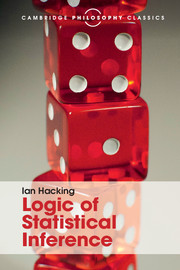Book contents
Preface to this edition
Published online by Cambridge University Press: 05 July 2016
Summary
The first sentences of the previous Preface to this book could have been written very recently: ‘Logic has traditionally been the science of inference, but […] few have studied the actual inferences made by statisticians, or considered the problems specific to statistics.’ That this holds for mathematical logicians is no surprise. But it also holds for philosophers concerned with the logic of science. Studies of induction, confirmation, experimentation and hypotheses formation abound, but the role of statistics in these scientific activities is not always apparent. Considering the centrality of statistics in scientific practice, and the focus on this practice within contemporary philosophy of science, one would expect interest in statistics to be far more pronounced.
When Ian Hacking wrote those sentences, he may have been referring to the research programme of inductive logic, as carried out by Carnap and his co-workers. Since then much has been done to bring inductive logic and the philosophy of statistics closer together. Over the past decades we have seen the rise of probabilistic, mostly Bayesian, epistemology. And in statistics, due to conceptual advantages but possibly also due to improved computing power, the use of Bayesian statistics has become more mainstream. These developments have invited research activity on the intersection of statistics, logic and epistemology, albeit over mostly Bayesian communication channels, and in line with an already impressive literature on the foundations of Bayesian statistics.
Philosophers of science are aware that many scientists use classical rather than Bayesian statistical methods, associated with the names of Fisher, Neyman and Pearson. But philosophical attempts to clear up classical methods are far less developed than those pertaining to Bayesian ones. Now that many scientists adopt a pragmatic attitude towards statistical methods, and many statisticians and methodologists take a nuanced stance towards the choice of methods, it seems high time that philosophers provide conceptual clarity for the full spectrum of methods. It is precisely for this reason that this reprint is remarkably well-timed. The Logic of Statistical Inference offers a broad and open-minded investigation into the nature and justification of statistical methods. It develops a middling position, centred on the notion of likelihoods as measuring support. It thereby provides an epistemic yet objectivist interpretation to classical statistics, which still deserves our serious consideration.
- Type
- Chapter
- Information
- Logic of Statistical Inference , pp. ix - xPublisher: Cambridge University PressPrint publication year: 2016

